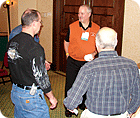
Elvis, a.k.a. SCAHACC member Henry Powers, made a special appearance at the meeting, sans hair.
Their efforts were highlighted in a special “Legislative Follies” skit during SCAHACC’s annual convention in Myrtle Beach this past January. The group poked lighthearted fun at some of the principals involved in the lobbying effort and at the governor.
The plan to get the bill passed through the South Carolina legislature was supported by the SCAHACC executive board, including its president, David Williams, owner of Gateway Supply and a distributor consultant forThe NEWS.
Williams took part in the skit and voiced his support for lobbyist Coretta Bedsole, who explained the entire process to SCAHACC members. Her example gave members an insight into how the legislative process works and a better understanding of what it takes to get a bill passed through the legislature.
ORIGINS OF CONSUMER SAFETY ACT
Back in 2003, a bill was passed in South Carolina requiring that all HVAC contractors be licensed. However, there was no stipulation in the law requiring the sale of HVAC equipment only to licensed contractors. The SCAHACC took exception to that and began to start a movement to close this loophole in the law. Dubbed the Consumer Safety Act, contractors pushed for its passage through the House and Senate.In August 2005, the SCAHACC legislative committee set its 2006 legislative goals, which included the continued building of a strong grassroots program with the membership and having the Consumer Safety Act introduced and through the House of Representatives. In a SCAHACC press release, Randy Pardee, legislative chairman, noted that the group’s “plan was to secure sponsors for the legislation, get the bill introduced, and then work it through the House so we could learn more about the process and which legislators would help us.
“Last summer, we never considered the fact that we might actually be able to get the law passed in one-half of a two-year session - that’s virtually unheard of for an association as young as ours in the legislative arena.”

John Hall, NEWS’ business editor, spoke with SCAHACC contractors after his keynote address.
Dubbed the “Handyman Act” by his critics, Sanford explained that he didn’t believe it was the government’s role to tell a buyer and seller “that a transaction is illegal when the consequences of that transaction does not entail material harm to the public at large. If the buyer knows that the installer is not licensed and proceeds anyway, it is the buyer’s right to do so. This bill will eliminate competition, and drive the cost of selling and installing heating and air conditioning systems higher.”
In his reply to Sanford’s veto, Pardee scolded the governor for what “seemed to show a lack of respect and understanding of the HVAC industry and the professionals who work in that industry.”

SCAHACC President David Williams shared the spotlight with lobbyist Coretta Bedsole, discussing the failure of the Consumer Safety Act.
THE PROCESS IS A GOOD ONE
In spite of the disappointing setback, SCAHACC members are determined to continue working with the legislature to pass laws to benefit the HVAC trade, including an effort to override Sanford’s veto of the bill. The group’s grassroots movement impressed Bedsole enough to bring her to the group’s Myrtle Beach meeting to explain some of the ways they can work to affect change.“A lobbyist is only as good as the grassroots organization behind her,” she said. “And this group really did their homework. It was enough to pass the bill through the House and Senate.” Bedsole said that this type of success is very unusual for a group’s first attempt.
She noted that SCAHACC did a good job of building its infrastructure - a key element in building a grassroots movement. And she advised contractors to continue building relationships with their legislators, adding that lawmakers need open dialogue with constituents. “Legislators have good intentions, but they are only as good as the information that is given to them,” Bedsole commented. “Ninety-nine percent of the time they will try and do the right thing if you help them find the way to do the right thing.”
She said that when choosing where to start, it is best to start where there is the widest support. In the case of the Consumer Safety Act, the strongest support was in the House.
Through her efforts and those of the SCAHACC legislative committee, misconceptions of the bill’s intentions were cleared up when legislators were given accurate and factual information. She encouraged contractors to keep seeking an audience with their legislators by requesting face-to-face meetings or leaving telephone messages.
“Don’t leave an e-mail message,” she noted. “It might not be read and doesn’t have the same impact as speaking in person.”
Although their efforts fell short and there was disappointment and bitterness, SCAHACC members were told by Bedsole to keep fighting and to not react negatively toward any lawmakers, including the governor.
“Don’t hold a grudge,” she said. “Your enemy today could be your friend tomorrow.”
As for the future of the Consumer Safety Act, Williams made it very clear what his intentions are. “We’ve only begun to fight,” he said in a written statement. “With the governor’s’ comparison of our trade to that of handymen, we obviously have much more education and work to do and this, ‘handyman veto’ as we call it, will only fuel our efforts.”
For more information, visit www.schvac.org.
Publication date:03/05/2007

Report Abusive Comment